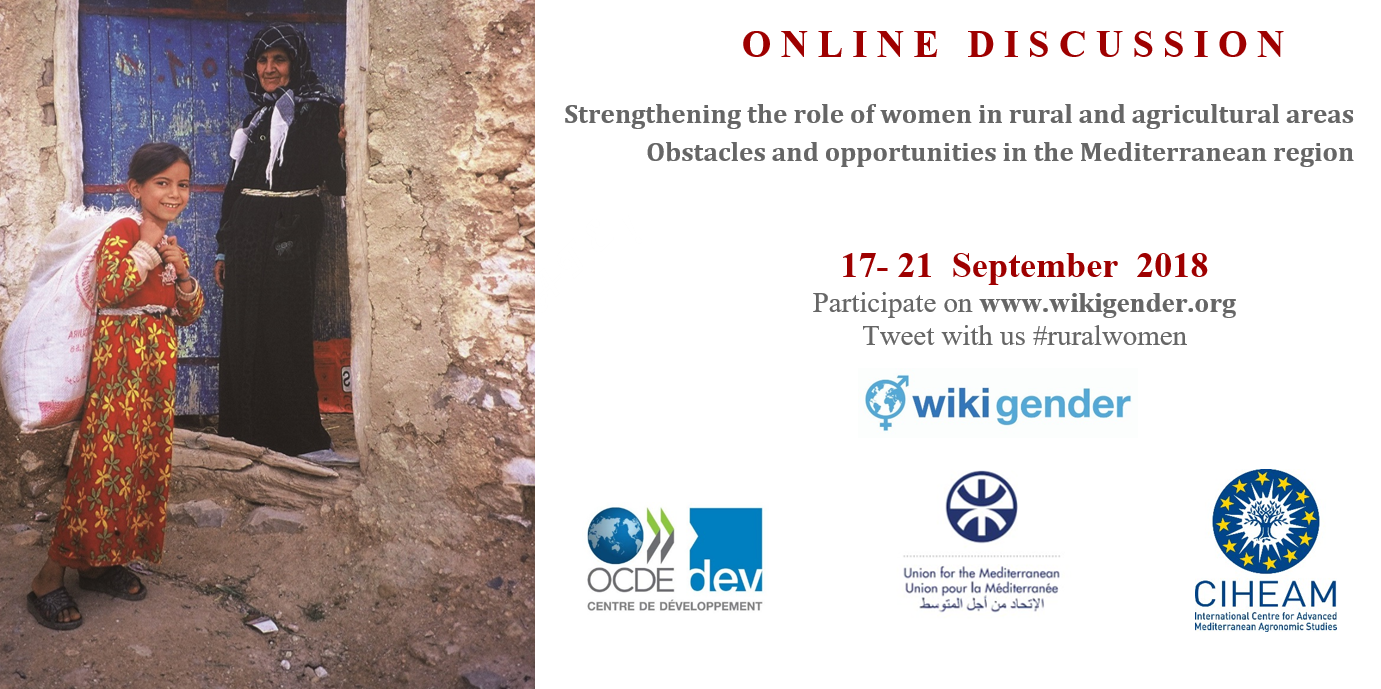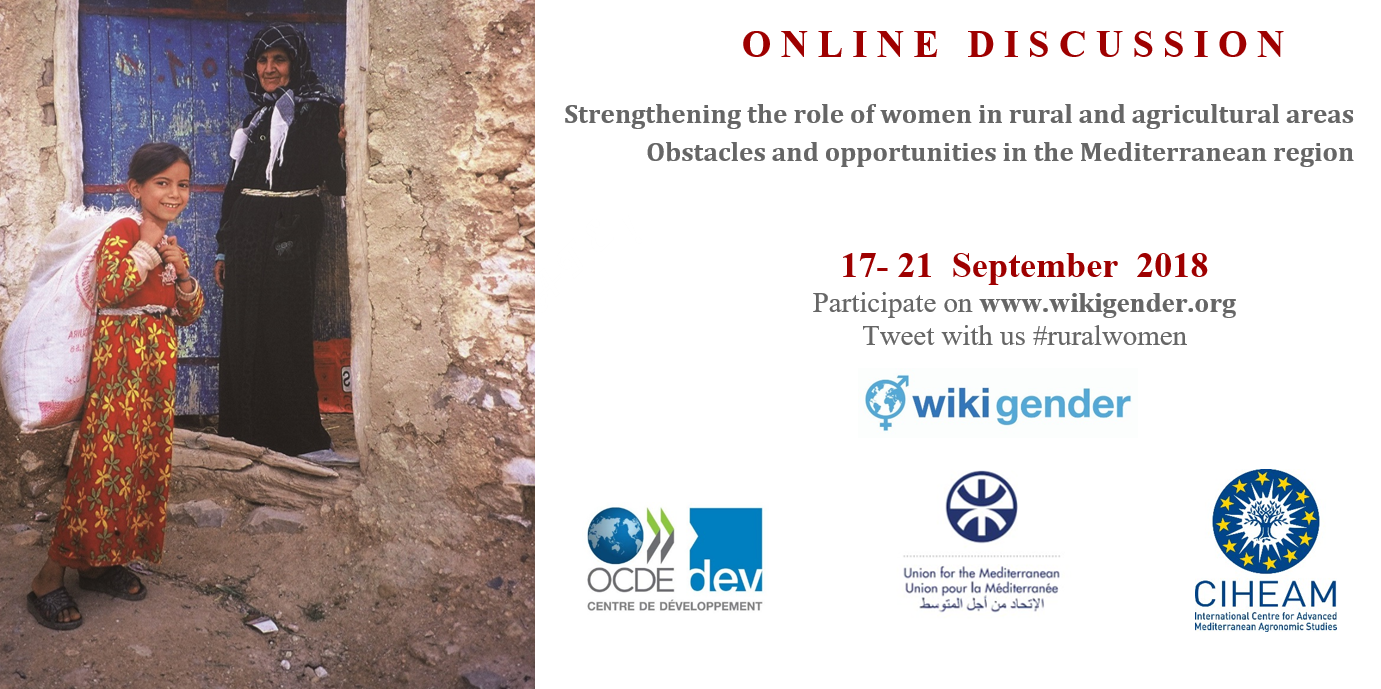Online discussion: Strengthening the role of women in rural and agricultural areas – obstacles and opportunities in the Mediterranean region


Read the synthesis report of the online discussion here.
Context
Rural women play a key role in the development of rural and agricultural areas. They account for 43% of the world’s agricultural workforce, a percentage that reaches 70% in some countries. In North Africa and the Middle East, according to available data, the number of women in the agricultural workforce rose from 34% in 1995 to almost 45% in 2011.
Women are responsible for the majority of agricultural work, controlling most of the non-monetary economy (subsistence agriculture, childcare and child education, household responsibilities, water and energy supply). They are a major contributor to food and nutritional security, to generating income and to improving the livelihoods and general welfare of households, particularly those with low incomes.
Rural women are increasingly leading their own businesses, although their entrepreneurial potential remains largely unknown and underutilized. In terms of their role in the management of natural resources and their responsibilities in the provision of energy in their homes, they are leading actors in the fight against climate change.
Because of their role in the agricultural economy, women are at the heart of the resilience of rural societies and are a response to the Mediterranean challenges related to food security, the preservation of rural ecosystems, the sustainable management of Natural resources, adaptation to climate change and conservation of agro-biodiversity, and the issues of nutritional transition.
This strategic importance is included in the SDGs (1, 2, 5, 13), the regional plans and was underlined at the 62nd session of the UN Commission on the status of Women (2018), whose priority theme this year was “Challenges and opportunities in achieving gender equality and the empowerment of rural women and girls”.
While, at the global level, the participation in economic, social and political life remains unequal between women and men, these inequalities are manifested more intensely in the rural areas of the Mediterranean area. Women living in rural areas accumulate difficulties, inequalities and discrimination:
- They suffer from the effects of marginalization of the territories with limited access to basic infrastructure. They have less access to land and productive resources, have less or no qualified jobs and are less paid than men. They have less access to education, training and skills development, transportation, financial services, fertilizer use, mechanical equipment or new technologies. It is also common for women working on farms or family businesses to receive no salary.
- Particularly affected by natural disasters (irregular rainfall, floods, water scarcities…) and the effects of climate change on agriculture, women are the first to “absorb the shocks” of food crises.
- Rural women are subject to discrimination within the social and legal norms that govern their communities. Indeed, the impact of social norms and customary law is closely linked to the remoteness of rural areas where statutory law is more difficult to know, recognized and applied than in the urban area.
- Under-representation of women in organizations and institutions is more important in rural areas. Women remain uninformed about their rights, what reduces their participation in public policy decision-making processes.
The lack of recognizing and valuating of the role of women in rural areas and in agriculture is harmful not only for women but also for the whole society. This lead to the implementation of policies and programmes that are poorly oriented or even inadequate to the needs of women. Despite the many obstacles they face, rural women are a key to the development of the Mediterranean, as soon as their potential is recognized and valuated and addressing gender inequalities is in the center of public and private policies.
About the discussion
As part of the publication “Strengthening the role of women in rural and agricultural areas: obstacles and opportunities” (September 2018) and the conference “Women4Mediterranean Conference 2018 – Women build inclusive societies” (Lisbon, Portugal, 10- 11 October 2018), during which the “Empowering Women in Rural and Agriculture Areas” (UM-CIHEAM) workshop will take place, Wikigender, CIHEAM and the UfM organize an online discussion on the topic “Strengthening the role of women in rural and agricultural areas: obstacles and opportunities “.
This online discussion aims to:
- Provide a space for dialogue and knowledge exchange, in French and English
- Promote and exchange examples of good practice
- Propose recommendations for the engagement of development and international cooperation actors.
Participants are invited to contribute to the discussion from 17 to 21 September on the Wikigender platform. In order to bring together diverse audiences, the discussion will take place in English and French, and will also continue on Twitter and Facebook with the hashtag #Ruralwomen.
A summary report summarizing the main recommendations raised during the discussion will be published on Wikigender website and presented during the conference “Women4Mediterranean Conference 2018”.
The report, available in English and French, will be also shared with the respective communities of Wikigender, CIHEAM and UfM, and presented during the next international events (October 15 for World Rural Women’s Day, October 16 for World Food Day, March 8th for International Women’s Day).
Guiding Questions
This online discussion will aim to investigate the different situations in the Mediterranean by analyzing challenges and opportunities related to strengthening the role of rural women in the economic, social, legal and political spheres.
The interventions will help to better understand the challenges but also the opportunities of the gender approach in rural, coastal and agricultural sustainable development initiatives and policies.
A. Understanding the situation of rural women:
- What is the role of rural women in sustainable development goals?
- What are the social, economic and environmental challenges facing rural women and girls? (compared to men and women in urban areas)
- How to overcome barriers to empowering rural women?
B. Identify what works
- What are some examples of policies, programs or initiatives addressing gender barriers faced by women and girls in rural areas?
- What are the existing best practices to better integrate the gender dimension into agriculture and rural development?
C. Recommendations: achieving the Sustainable Development Goals:
- How can the 2030 Agenda be used to address the current challenges facing rural women?
Key Resources
- CIHEAM Watch Letter
- CIHEAM Contribution to Women Empowerment
- UpM
- Wikigender
- Do discriminatory social institutions matter for food security? (OECD, 2012)
To receive a certificate of participation, please contact dev.gender@oecd.org
Contribute!
We look forward to your participation! We strongly encourage you to disseminate news about the online discussion via your networks and on Twitter using #RuralWomen and the following link to this page: http://bit.ly/2wGSxMR
- To participate, simply type your comment below or register directly via Disqus, Twitter, Facebook or Google before typing your comment. Open for comments from 9am on 17/09 until 6pm on 21/09
- To insert a URL hyperlink, make sure you shorten the URL first before posting it, otherwise it may not work. (e.g. using bitly, google url shorterner, tiny url…)
Anyone with an Internet connection is invited to participate in the discussion and we encourage you to express your views on this pressing issue.
Please note however that comments will be moderated to ensure that there is no spam disrupting the discussion.
Problems to comment?
Please make sure your browser supports Javascript. Disqus is rendered correctly in all major web browsers, including Internet Explorer, Firefox, Chrome, Safari, and Opera.
If you encounter any problem posting your comment, please email us at contact@wikigender.org and we will assist you.


